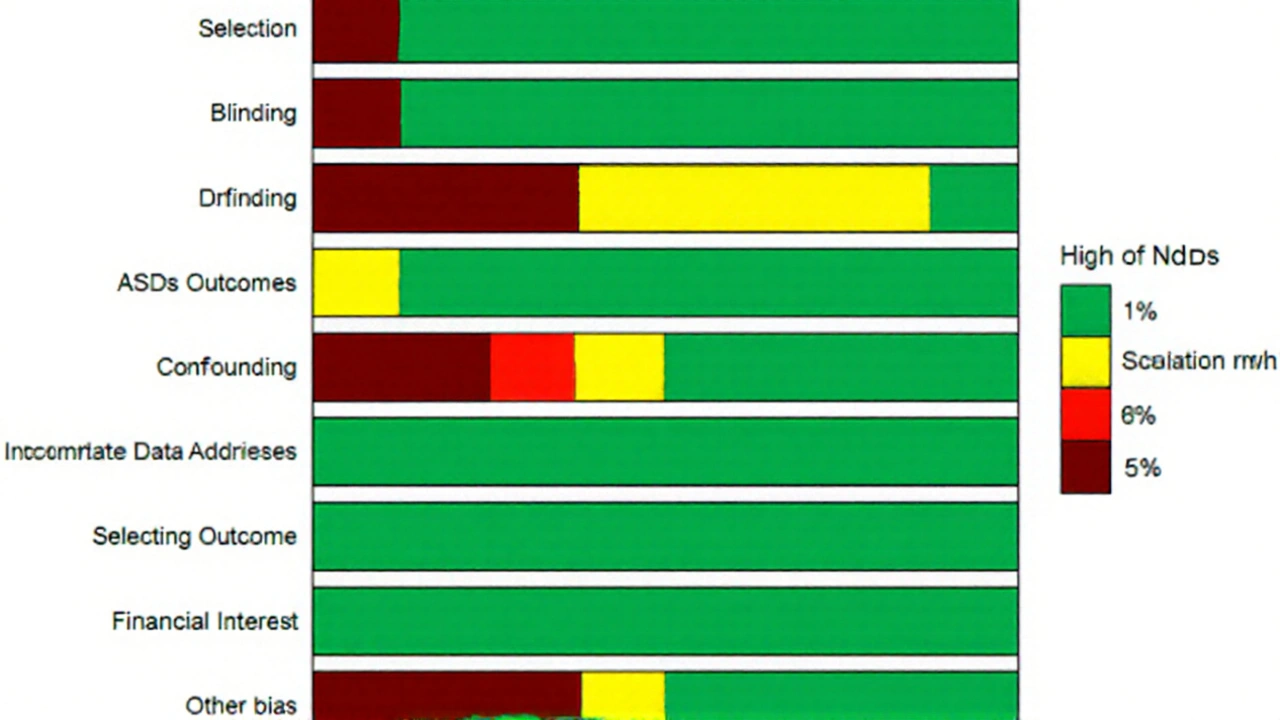Conflicting Study Results and What They Mean
Scientists have been scrambling to understand whether a drug as common as acetaminophen could affect a child's brain development. A systematic review published in BMC Environmental Health pulled together 46 studies from around the globe and concluded that there is a statistical association between prenatal acetaminophen exposure and higher rates of autism spectrum disorder (ASD) and attention‑deficit/hyperactivity disorder (ADHD). The authors used the Navigation Guide framework, a method praised for its rigor in environmental health assessments.
Researchers at Mount Sinai echoed those findings. Dr. Diddier Prada, who leads the team, noted that the higher‑quality investigations—those with larger sample sizes and better exposure tracking—tended to show the strongest links. Their argument hinges on the sheer scale of acetaminophen use: if even a modest increase in risk exists, the public‑health impact could be huge.
On the other side of the debate, a Swedish nationwide cohort study involving 2,480,797 births tells a different story. Initial models that did not adjust for family‑level factors hinted at a slight uptick in autism and ADHD risk. However, when the researchers compared full sibling pairs—essentially controlling for genetics and shared home environments—the hazard ratios hovered around 1.0 (autism HR 0.98, ADHD HR 0.98, intellectual disability HR 1.01). In plain language, the sibling analysis found no evidence that acetaminophen use during pregnancy raises the odds of these neurodevelopmental conditions.
These opposing outcomes have sparked a lively debate about how best to isolate a drug’s effect from the many other variables that influence child development. Some experts argue that the Swedish study’s design is more robust because it mitigates confounding, while others caution that sibling analyses can mask true effects if the exposure varies little between siblings.

Clinical Guidance, Regulatory Stance, and Practical Takeaways
Amid the scientific tug‑of‑war, professional bodies have weighed in. The American College of Obstetricians and Gynecologists (ACOG) maintains that acetaminophen remains a safe option for managing pain and fever in pregnant patients, citing a large body of evidence that supports its low risk profile. The U.S. Food and Drug Administration, while acknowledging the ongoing research, has opened a docket to explore potential label updates but has not yet mandated any change.
Doctors emphasize a balanced risk‑benefit approach. Untreated fever, especially high‑grade fever, is linked to neural tube defects and preterm birth, so opting out of medication altogether could create its own set of problems. The prevailing recommendation is to use the lowest effective dose for the shortest possible duration, and always under medical guidance.
- Consult your obstetrician before starting or continuing acetaminophen.
- Limit use to situations where pain or fever is moderate to severe.
- Stick to the dosage limits recommended for pregnancy (generally no more than 3,000 mg per day).
- Keep a medication diary to help your provider assess exposure.
Research into the biological plausibility of a link continues. Laboratory studies suggest that acetaminophen can cross the placenta, possibly triggering oxidative stress, disrupting hormonal pathways, or inducing epigenetic modifications—mechanisms that, in theory, could affect brain development. However, these findings have yet to translate into definitive proof that the drug causes autism or ADHD.
The broader picture is that neurodevelopmental disorders arise from a complex interplay of genetics, environment, and timing. Pinpointing a single contributor is challenging, and the current data set reflects that complexity.
Looking ahead, scientists call for larger, longitudinal studies that can better account for confounding variables and track outcomes well beyond early childhood. There is also growing interest in finding alternative remedies for pain and fever that pose even less uncertainty for pregnant women.
For now, the consensus among clinicians is clear: do not stop taking acetaminophen without a professional recommendation. Each pregnant woman’s situation is unique, and decisions should be made collaboratively with her healthcare team, weighing the immediate need for symptom relief against the still‑inconclusive evidence regarding long‑term neurodevelopmental effects.



Comments
Wow, another groundbreaking revelation that over‑the‑counter Tylenol might be a silent mastermind behind autism-who would've guessed?
I mean, it's not like we've been taking it for decades without any drama, right?
The systematic review pulling together 46 studies sounds like a massive Netflix binge, except the plot twists involve statistical associations and hazard ratios.
Sure, correlation doesn't equal causation, but why let that ruin a good dose of sarcasm?
The Mount Sinai crew apparently found stronger links in the “higher‑quality” studies, as if quality control magically spawns risk.
Meanwhile, the Swedish sibling analysis says “nah, bro, we’re good,” which is as comforting as a lukewarm cup of coffee after a sleepless night.
But hey, sibling studies might be hiding the truth because siblings often share the same parental decisions about medication.
And let’s not forget the ACOG and FDA playing the usual cautionary tune, reminding us that fever itself is the real villain.
So what’s the takeaway? Panic and stop all medication, or keep pragmatically using the lowest effective dose?
The answer, of course, lies somewhere between the two extremes-like a Goldilocks scenario with a side of uncertainty.
If you love drama, you can write a meme about “acetaminophen: the silent killer,” and if you hate drama, you’ll just trust your OB‑GYN.
Meanwhile, researchers are busy chasing epigenetic mechanisms that sound like sci‑fi, hoping to prove a causal chain.
Until then, expectant mothers are left juggling fever, pain, and a mountain of conflicting papers.
So, grab a cup of tea, keep a medication diary, and maybe don’t panic‑sell your pantry of Tylenol just yet.
In the end, the best advice is still: use it wisely, not because of a horror story, but because you actually need relief.
The data presented is a textbook case of statistical over‑interpretation, where a modest association is magnified into a public health panic.
When controlling for familial confounders, the Swedish cohort essentially nullifies the risk, suggesting that the apparent signal may be an artifact of unmeasured variables.
Moreover, the mechanistic hypotheses-oxidative stress, hormonal disruption-remain speculative without consistent in vivo validation.
From a risk‑benefit perspective, the real danger lies in untreated fever, which carries known teratogenic risks.
Thus, the prudent clinical approach is to maintain evidence‑based dosing guidelines rather than succumb to sensational headlines.
i guess thats the vibe, definetly.
Consider this: every pharmacological choice we make is a negotiation with the unknown, a dialogue between our immediate comfort and the future's potential.
While the data swings like a pendulum, the underlying principle remains unshaken-do not let fear eclipse rationality.
We are not slaves to hypothetical epigenetic whispers; we are masters of informed consent, armed with the privilege of medical counsel.
In the grand tapestry of maternal health, fever is a proven antagonist, whereas acetaminophen, when judiciously applied, is merely a tool.
Hence, the aggressive stance should be directed at misinformation, not at a medication that has served generations responsibly.
Morality dictates we err on the side of caution-any uncertainty is a call for restraint, not reckless indulgence.
Stop playing with your baby's future, and think twice before you pop another pill.